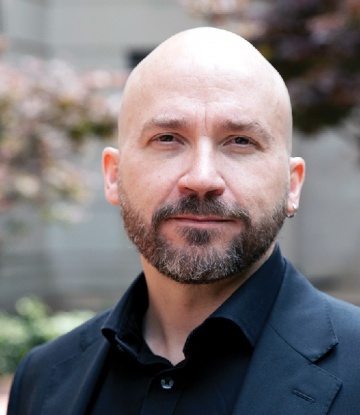Columbia College | Columbia University in the City of New York
This Was Not Written By a Machine

Core Curriculum director Larry Jackson
EMMA ASHER
It was the wrong analogy, I told him. Writing is a way of thinking, not a means for reaching your destination quickly.
Decades before the advent of generative artificial intelligence (AI), Hannah Arendt, one of the authors that our students encounter in Contemporary Civilization, made a distinction between cogitation and thinking. Arendt described cogitation as the “technical, logical operation which electronic machines may be better equipped to perform.” Thinking, in contrast, “arises out of the actuality of incidents” and is bound to “living experience” as its guidepost or focus.
Real thinking — unlike artificial intelligence — requires a biography, a personality and the cares and commitments that define our character. When we think, we confront the world and its history, as well as events in our lives, however great or small.
This is one of the reasons why the best defense we have against the threat that AI poses to academic integrity is not cutting-edge technology, but old-fashioned pedagogy. Instructors who know their students can judge whether their essays are original far more reliably than an online AI detector. They will recognize their students’ interests and ideas from class discussions and office hours. They will know their students’ styles as writers from working closely with them on assignments. And when the instructor comes across the rigid, generic prose of a large language model, it will be like hearing the tinny sound of a robot from an old sci-fi movie rather than the student’s voice.
Developing and promoting such AI-proofing strategies in our classes is one of the three tasks that a group of Core Curriculum instructors are now tackling thanks to the generosity of Judith and Marshall Meyer ’64, who have made a gift to the College that enables faculty to experiment with generative AI and share their findings with colleagues in discussions and reports.
Second, these instructors are exploring how AI can be used to enhance assignments and other aspects of the Core experience without compromising the interpretation, critical judgment and collaborative thinking that are the hallmarks of our curriculum.
The third task that the Meyer Innovation Fund will enable us to take on is the one raised by my friend: showing a skeptical world why the painstaking work of interpreting works and testing ideas in writing and discussion will never go the way of the horse and buggy.

Hannah Arendt
This is exactly where we want the Core to lead students: not to the firm ground of certainty, but to the terra incognita of inquiry and doubt. No machine can get us there — only our living minds, in dialogue with texts that provoke perplexity and invite discussion with other people.
Arendt thought that many of the problems of human affairs were caused by an inability to think. In her view, the internal “two-in-one” dialogue of thinking was the origin of conscience. Arendt even defined her controversial concept of “the banality of evil” as thoughtlessness, or the “almost total inability ever to look at anything from the other fellow’s point of view.”
But Arendt was also concerned with problems of meaning. Her works are full of conceptual distinctions like the difference between work and labor or power and force. Such nuances matter if you wish to grapple with the complexities of reality. Writing forces us to think carefully about the meaning of our words and to choose them deliberately — something that even those who use AI to produce speeches and memos, as my skeptical friend often does, must be able to do if they are to judge the quality and accuracy of a large language model’s output.
Whatever AI can produce for us, it can’t give us answers to the questions that we are all bound to ask at some point, which concern not only the definitions of our words, but also the meaning of our lives. Whether moral, political, existential or aesthetic, when we are faced with such questions — “How should I live?” “What are my rights and obligations?” “What makes this beautiful?” — we shouldn’t rush to answer them. We should instead heed Arendt’s advice to “stop and think.”
Issue Contents
Published three times a year by Columbia College for alumni, students, faculty, parents and friends.
Columbia Alumni Center
622 W. 113th St., MC 4530, 6th Fl.
New York, NY 10025
212-851-7852
cct@columbia.edu
Columbia Alumni Center
622 W. 113th St., MC 4530, 4th Fl.
New York, NY 10025
212-851-7488
ccalumni@columbia.edu

